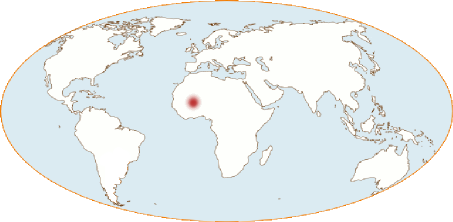Your search results [2 articles]
The dolo-beer brewsters of Ségou in Mali.
Mali: an African country with a rich multi-ethnic cultural history, endowed since the 16th century with typically African political structures: a hereditary centralised political power held by the clan of a majority ethnic group that subjugates other vassal ethnic groups within a confederation controlling a vast territory. The Bambara kingdom of Segou is such an example.
Ségou in Mali: a very old African city on the banks of the Niger. Its prestigious past makes it the equal of Timbuktu located downstream on the river, or of Djenne. It was originally a market town of fishermen, the Bozos. Around 1712, Biton Mamary Coulibaly founded a small principality with Segou as its center. Between 1712 and 1755, he structures the tons into a real professional army composed of volunteers, the tondjons (servants of the ton[1]) who incorporated war captives and farmers unable to pay the compulsory tax on the dolo-beer. The boundaries of the kingdom then extended along both banks of the Niger, between Bamako and Timbuktu. All these events are recounted in the Bambara Epic of Segou.
Dolo: a traditional sorghum or finger millet beer with multiple functions[2]. It is first of all a local beer for everyday use or a beer brewed for festivities and collective rejoicing, then a diplomatic fermented beverage served during political negotiations and ceremonies organised by the royal courts. It is also a beverage of worship to the ancestors and protective spirits. This beer was also used to pay a tax in kind to the power holders of the Bambara kingdom of Segou between 1712 and 1861, the date of the victory of El Hadj Oumar Tall over this kingdom.
The dolo brewers: the women who brew dolo in their concession and sell the beer on the spot. Specialists in brewing beer, these women master the elaborate process of brewing beer, which takes a week or more. Nowadays, it is a source of income for their families, a social status that ensures them a degree of independence, and a responsibility that is not without risk when dealing with alcoholic beverages.
In cities like Segou, you have to look for the Catholic quarter - in this case the Mission quarter, located behind the cathedral - to see the dolo making and taste this traditional beer.
No less than fourteen cabarets are located here. Originally, it was the Bobos who brought the technique of brewing dolo. They run most of the cabarets, even if the practice has now been extended to Bambara families.
It is therefore mainly a matter of Catholics, but also and exclusively a matter of women: the dolotières.
Stocks of wood piled up in front of the entrance to some family concessions and the continuous back-and-forth of people entering and leaving the premises betray an unusual activity...
Come closer and see: here you are in the heart of a colourful world where the canaries are bubbling, the women are busy chatting, and the men, heavily seated, are passing the calabashes from hand to hand... Welcome to a dolo cabaret!
[1]Initially, the ton was a male age group dedicated to the protection of the clan and committed to warfare within a Bambara society composed mainly of farmers and fishermen. With the emerging first and rivaling kingdoms in 16th century Mali, the tons freed themselves from their social affiliation to create multi-ethnic warrior groups in the service of a project of political domination on a regional scale. Like the Mamluks in Egypt, their growing political power sometimes dictated its rule to the reigning dynasties.
[2] dolo is a generic term for various kinds of millet or sorghum beer in Mali, Burkina Faso and western Niger. Further south and west, near the Atlantic shores, the generic names for traditional beers differ. However, in this part of sub-Sahelian Africa, each African people, each ethnic group designates its own beer (or beers) in its own language. The word dòlò = beer seems to have originated anciently in the Mande languages, adopted by neighbouring languages. This borrowing and these wider linguistic usages are the consequences of the profound political upheavals experienced by the peoples of the Niger basin since the 15th century. Later in the 19th century, the European colonisation has also encouraged the use of trans-ethnic vocabularies or African creoles. For the colonists and the African peoples in that region too, Dolo came to mean the traditional beer as opposed to the industrial European beer that was then imported in bottles.




.jpg)
, quartier de la Mission à Segou (Mali)..jpg)
.jpg)